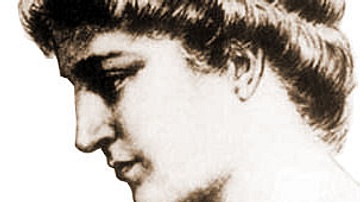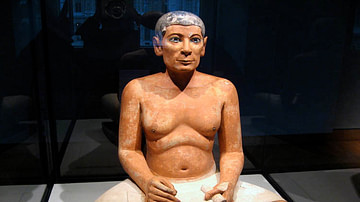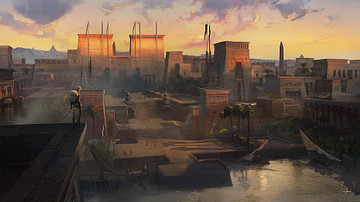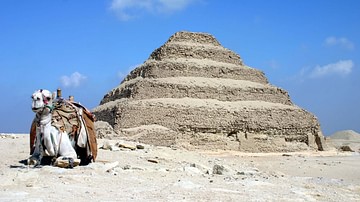
Hypatia of Alexandria (c. 370 - March 415) was a female philosopher and mathematician, born in Alexandria, Egypt possibly in 370 (although some scholars cite her birth as c. 350). Little is known of her life but her dramatic death at the hands of Christian fanatics is well-documented and has become what she is best remembered for.
She was the daughter of the mathematician Theon, the last Head Librarian of the Library of Alexandria, who tutored her in math, astronomy, and the philosophy of the day which, in modern times, would be considered science. Nothing is known of her mother and, as noted, there is little information about her life. As the scholar Michael A. B. Deakin writes:
The most detailed accounts we have of Hypatia's life are the records of her death. We learn more about her death from the primary sources than we do about any other aspect of her life. (49)
She was murdered in 415 by a Christian mob who attacked her on the streets of Alexandria. The primary sources, even those Christian writers who were hostile to her and claimed she was a witch, are generally sympathetic in recording her death as a tragedy. These accounts routinely depict Hypatia as a woman who was widely known for her generosity, love of learning, and expertise in teaching in the subjects of Neo-Platonism, mathematics, science, and philosophy.
Alexandria's Development
Alexandria, Egypt was founded on the site of the older port city of Rhakotis by Alexander the Great in c. 331 BCE. Alexander is said to have drawn up the plans for the city himself and then left construction up to his commander Cleomenes of Naucratis and architect Dinocrates of Rhodes while Alexander himself continued on his military campaigns. Cleomenes and Dinocrates raised the original city but it was developed to its height by one of Alexander's generals, Ptolemy I (r. 323-282 BCE), who ruled Egypt after Alexander's death.
Ptolemy I established the Library of Alexandria which included the Mouseion (Temple of the Muses, also known as the Museum) the Royal Library, and the Temple to Serapis (the Serapeum) and turned the city into a cultural and intellectual center rivalling Athens. Scholar Lionel Casson comments:
In ancient times, the word museum normally referred to a religious establishment, a temple for the worship of the muses; Ptolemy's creation was a figurative temple for the muses, a place for cultivating the arts they symbolized. It was an ancient version of a think-tank: the members, consisting of noted writers, poets, scientists, and scholars, were appointed by the Ptolemies for life and enjoyed a handsome salary, tax exemption (no inconsiderable perquisite in the Ptolemaic kingdom, free lodging, and food. There was no danger of funds running out since the institution had an endowment granted by Ptolemy I when he set it up. (33)
Alexandria attracted the best minds of the day in the sciences, mathematics, philosophy and many other disciplines. The great mathematician Archimedes (l. 287-212 BCE) studied there and may also have taught courses. The philosopher and geographer Eratosthenes (l. c. 276-195 BCE) taught there and it was at Alexandria that he calculated the circumference of the earth. The mathematician Euclid (l. c. 300 BCE) also taught at Alexandria and the brilliant engineer and mathematician Hero (also given as Heron, 10-70 CE) lived and worked there.
The city prospered under the early rulers of the Ptolemaic Dynasty but steadily declined under the others beginning with Ptolemy VIII in c. 145 BCE until it was taken by Rome following the Battle of Actium in 31 BCE. When the Roman emperor Constantine the Great (l. 272-337) decreed religious tolerance for Christianity, the Christians of Alexandria – previously persecuted – now felt empowered to strike back at their pagan adversaries. By Hypatia's time, religious differences and rivalries regularly divided the city and erupted in violence.
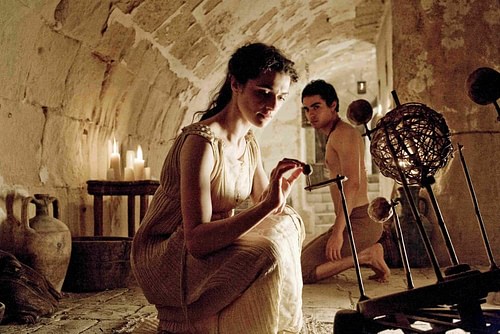
Hypatia and Her City
In a city which was becoming increasingly diverse religiously (and had always been so culturally) Hypatia was a close friend of the pagan prefect Orestes and was blamed by Cyril, the Christian Archbishop of Alexandria, for keeping Orestes from accepting the 'true faith'. She was also seen as a 'stumbling block' to those who would have accepted the 'truth' of Christianity were it not for her charisma, charm, and excellence in making difficult mathematical and philosophical concepts understandable to her students; concepts which contradicted the teachings of the relatively new church.
By all accounts, Hypatia was an extraordinary woman not only for her time, but for any time and a popular public speaker. Michael Deakin cites the ancient historian Damascius describing her public lectures:
Donning the tribon [the robe of a scholar, and thus an essentially masculine item of apparel], the lady made appearances around the center of the city, expounding in public to those willing to listen on Plato or Aristotle or some other philosopher…There was a great crush around the doors [of her house], a confusion of men and horses, of people coming and going and others standing about for Hypatia the philosopher was now going to address them and this was her house. (58)
Her father, Theon, refused to impose upon his daughter the traditional role assigned to women and raised her as one would have raised a son in the Greek tradition; by teaching her his own trade. Scholar Wendy Slatkin writes:
Greek women of all classes were occupied with the same type of work, mostly centered around the domestic needs of the family. Women cared for young children, nursed the sick, and prepared food. (34)
Hypatia, on the other hand, led the life of a respected academic at Alexandria's university; a position to which only males were entitled previously. Deakin points out that she surpassed her well-respected father as evidenced by ancient testimonies to her brilliance. She never married and remained celibate throughout her life, devoting herself to learning and teaching. The ancient writers are in agreement that she was a woman of enormous intellectual power, even the Christian writers such as John of Nikiu who were hostile toward her. Deakin comments:
The breadth of her interests is most impressive. Within mathematics, she wrote or lectured on astronomy (including its observational aspects - the astrolabe), geometry (and for its day advanced geometry at that) and algebra (again, for its time, difficult algebra), and made an advance in computational technique - all this as well as engaging in religious philosophy and aspiring to a good writing style. Her writings were, as best we can judge, an outgrowth of her teaching in the technical areas of mathematics. In effect, she was continuing a program initiated by her father: a conscious effort to preserve and to elucidate the great mathematical works of the Alexandrian heritage. (112)
This heritage was so impressive that Alexandria rivalled Athens as a jewel of learning and culture. From the reign of Ptolemy I, Alexandria had grown to epitomize the best aspects of civilized urban life. Even in relative decline, the city was still a marvel of the Mediterranean world. Early writers like Strabo (63 BCE-21 CE) describe the city as "magnificent" and the university was held in such high regard that scholars continued to flock there from around the world in spite of the religious rivalries and violence. The great Library of Alexandria is said to have held 500,000 books on its shelves in the main building and more in an adjacent annex. As a professor at the university, Hypatia would have had daily access to this resource and it seems clear she took full advantage of it.
Religious Intolerance and Death
Alexandria was still a significant seat of learning in the early days of Christianity - though nowhere near as great as it had been under the early Ptolemaic Dynasty - but, as the faith grew in adherents and power, became increasingly divided by fighting among religious factions. It is by no means an exaggeration to claim that Alexandria was destroyed as a centre of culture and learning by religious intolerance and Hypatia has come to symbolize this tragedy to the extent that her death has been cited as the end of the classical world.
The archbishop Cyril was routinely frustrated by Hypatia's popularity and her friendship with the prefect Orestes. The Christian chronicler John of Nikiu explains the situation from Cyril's point of view:
And in those days there appeared in Alexandria a female philosopher, a pagan named Hypatia, and she was devoted at all times to magic, astrolabes and instruments of music, and she beguiled many people through her satanic wiles. And the governor of the city [Orestes] honored her exceedingly for she had beguiled him through her magic. And he ceased attending church as had been his custom. (Deakin, 148)
The tensions increased when Orestes had a man named Hierax, a zealous Christian and one of Cyril's men, publicly punished for inciting violence. Hierax had slipped into a synagogue to spy on the Jewish community for Cyril in order to find any evidence of Jewish plans against Christians. When the Jews noticed him, they complained to Orestes and Heirax was taken and punished. This enraged Cyril who encouraged the Christian community to attack the Jews. The Jews were killed and the survivors expelled from the city while their possessions were appropriated by the Christians and the synagogues converted to churches. In the religious frenzy inspired by their “victories” over the Jews, the mob then went searching for Hypatia.
Hypatia's Murder
In 415, on her way home from delivering her daily lectures at the university, Hypatia was attacked by this mob, consisting largely of Christian monks, dragged from her chariot down the street into a church, and was there stripped naked, beaten to death, and burned. The scholar Mangasar M. Mangasarian describes the scene as recorded by ancient historians:
The next morning, when Hypatia appeared in her chariot in front of her residence, suddenly five hundred men, all dressed in black and cowled, five hundred half-starved monks from the sands of the Egyptian desert — five hundred monks, soldiers of the cross — like a black hurricane, swooped down the street, boarded her chariot, and, pulling her off her seat, dragged her by the hair of her head into a — how shall I say the word? — into a church! Some historians intimate that the monks asked her to kiss the cross, to become a Christian and join the nunnery, if she wished her life spared. At any rate, these monks, under the leadership of St. Cyril's right-hand man, Peter the Reader, shamefully stripped her naked, and there, close to the altar and the cross, scraped her quivering flesh from her bones with oyster shells. The marble floor of the church was sprinkled with her warm blood. The altar, the cross, too, were bespattered, owing to the violence with which her limbs were torn, while the hands of the monks presented a sight too revolting to describe. The mutilated body, upon which the murderers feasted their fanatic hate, was then flung into the flames. (6)
In the aftermath of Hypatia's death, whatever may have been left of the University of Alexandria where Theon and his daughter taught was sacked and burned on orders from Cyril, pagan temples were torn down, and there was a mass exodus of intellectuals and artists from Alexandria. Cyril was later declared a saint by the church for his efforts in suppressing paganism and fighting for the true faith. Hypatia's death has long been recognized as a watershed mark in history delineating the classical age of paganism from the age of Christianity.
Conclusion
The 2009 feature film Agora, which tells the story of Hypatia's life and death, accurately depicts the religious turmoil of Alexandria c. 415 at the same time that it takes license with events in the philosopher's life (such as the details of her death). The film sparked controversy upon its release from some segments of the Christian community who objected to the depiction of early Christians as fanatical enemies of learning and culture.
Although Alexandria began its decline after Ptolemy VIII expelled the foreign scholars from the city and patronage of the Library of Alexandria by the royal house flagged, the city lost its place as a great cultural center completely after the rise of Christianity and the resultant religious intolerance that drove civil unrest. History is clear, in fact, that Alexandria began a steady decline as Christianity rose in power and the death of Hypatia of Alexandria has come to embody all that was lost to civilization in the tumult of religious intolerance and the destruction it engenders.

